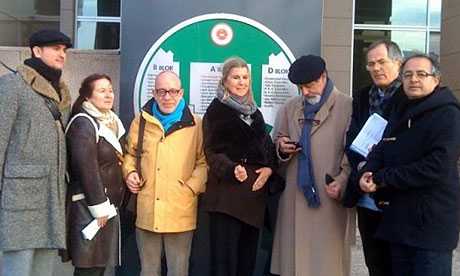PEN Turkey accused of breaking law by condemning musician’s prosecution as a ‘fascist development’

Alison Flood
The Guardian
PEN Turkey
Members of the PEN Turkey board outside the Istanbul Public Prosecutor’s Office
In a twist worthy of George Orwell, writers’ organisation and free speech campaigner PEN Turkey is under investigation in Turkey for “insulting the state” after condemning the prosecution of a musician as a “fascist development”. Ironically, the attack on free speech comes in a week when the Turkish government lifted the ban on many books that have been prohibited over the decades, including The Communist Manifesto.
According to AFP, the lifting of the ban follows the adoption of a bill by parliament in July declaring that the decision to prohibit any book before 2012 would become invalid if it was not confirmed by a court within six months. That date has now passed, and at least 1,000 books are now unbanned. The move, however, has been described as “largely symbolic”, as many of the books were still in circulation, and fresh bans have been sought already this year on titles including Of Mice and Men, which has drawn complaints over “immoral” passages according to Turkish paper Hurriyet.
“Turkey has been bringing a number of its laws into line with the EU and this is among a number of changes,” said Sara Whyatt, director of the Writers in Prison committee at PEN International. “They’re talking about going back as far as Ottoman times, so it is referring to books which have been banned over at least the last century. The problematic part is that they continue to consider new banning of books, including Of Mice and Men.”
Whyatt said that while the unbanning of books is a “positive change”, the case against PEN Turkey “contradicts any positive changes which have been made”. She pointed out that there are “still a large number of writers before the courts and imprisoned, so the situation remains problematic”.
Now the Turkish branch of PEN is also under attack. When the pianist and composer Fazıl Say was called to court in Turkey in June for insulting “religious values” on social media, PEN Turkey condemned the move in a statement on its website. “The international community has been put on alert in the face of fascist developments in Turkey,” it wrote at the time. A complaint believed to have been made by a private individual, under the controversial Article 301 of the Turkish penal code which is intended to prevent “public denigration” of Turkey, has now been lodged against PEN Turkey, and yesterday six members of the free speech organisation’s board were called in for questioning by Istanbul’s public prosecutor’s office.
The PEN members include president Tarık Günersel and the poet and critic Nihat Ate, and if the investigation goes forward, they could face a prison sentence of six months to two years under Article 301.
PEN Turkey said in a statement submitted to the court that its words in June were “an expression of thought and a criticism, that they were not intended as being aimed as an insult. We emphasised that the right to criticise, a constitutional and legal right, was being exercised. As a result, it was requested that a decision not to prosecute would be given.”
The investigation has been widely condemned by PEN Turkey’s sister organisations around the world. PEN International president and author John Ralston Saul described it as an “extraordinary attack”, and “a misuse of a law which, in the context of international freedom of expression standards, itself should not exist”. Jo Glanville, director of English PEN, urged justice minister Sadullah Ergin “to repeal Article 301 and to drop the investigation against PEN Turkey at the earliest opportunity”.
“This and other cases highlight the fact that Turkey has a free expression problem,” said English PEN spokesperson Robert Sharp. “When ill-advised laws are put in place, then those with an ideological agenda will seek to use them to censor words or writing they do not like. This is why we campaign against ‘insult laws’ all over the world – including the UK. Censorship does not begin with the state instantly imprisoning authors and burning books. It begins with individuals using bad laws as weapons against each other.”
The PEN Turkey board members, if prosecuted, would join a large number of writers and journalists in prison and on trial in Turkey. In December, PEN International put the number at 30 writers in prison and 70 more on trial, including publisher and free speech activist Ragip Zarakolu, and Sel Publishing House, on trial for releasing a translation of William Burroughs’ The Soft Machine, and accused of furthering “attitudes that were permissive to crime by concentrating on the banal, vulgar and weak attributes of humanity”.
via Turkish writers’ group investigated for ‘insulting state’ | Books | The Guardian.


